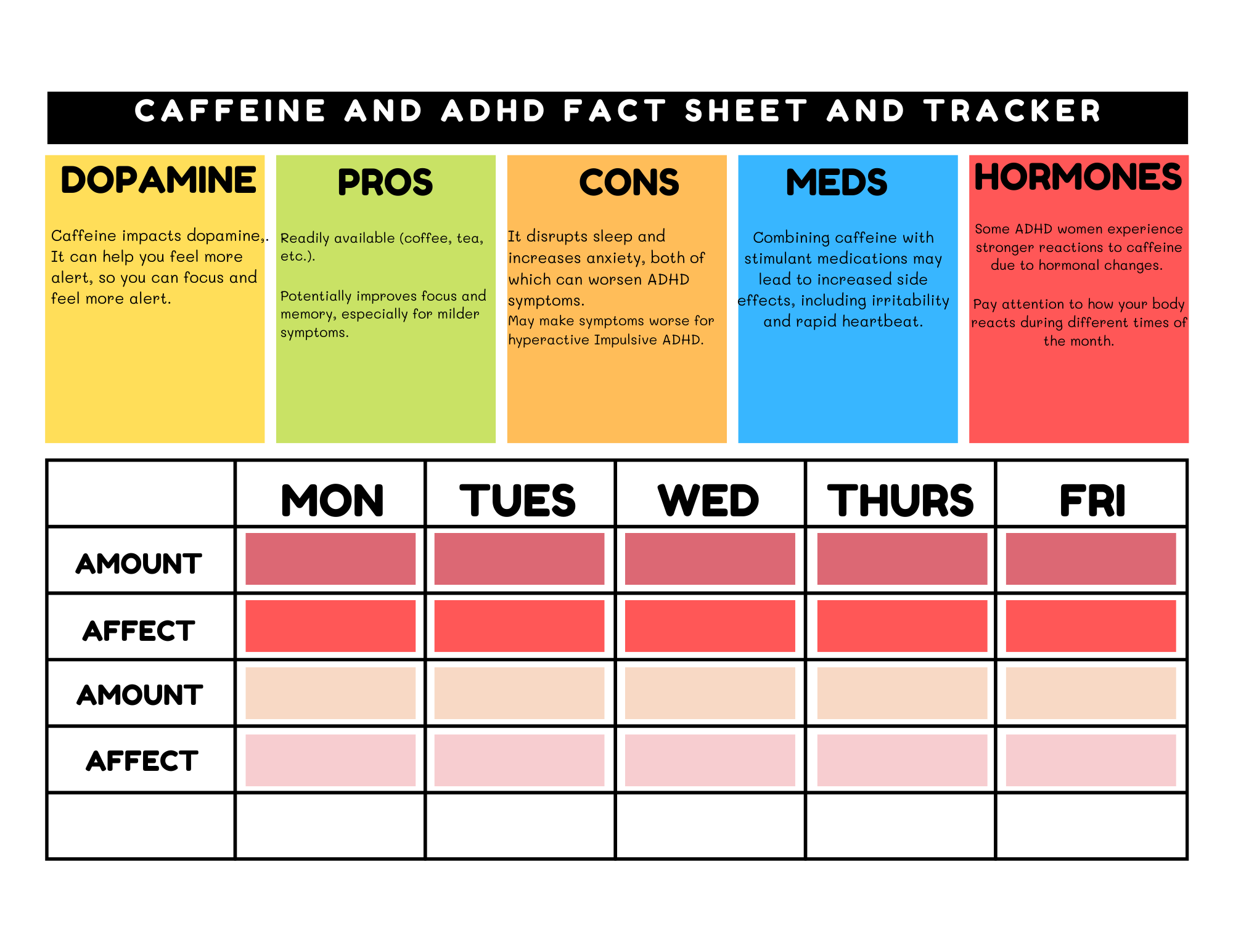Caffeine and Adhd: Does it help or hurt?
How Does Caffeine Affect ADHD Symptoms?
Did you know that caffeine is the most widely consumed psychoactive substance globally?But is caffeine a good choice for managing ADHD symptoms, particularly for women? For adhd WOMEN, caffeine can present both advantages and challenges.

How Caffeine Interacts with the Brain: Benefits and Drawbacks for ADHDers
Caffeine is something many people with ADHD turn to for a quick boost in focus and energy, but understanding how it affects the brain is key to deciding whether it's right for you.How caffeine affects women specifically may differ due to hormonal changes, so it’s worth considering how your body reacts at different times.
Understanding How Caffeine Works
- Dopamine Boost:
Caffeine works by blocking adenosine, a chemical that makes you feel tired. This indirectly increases dopamine, a brain chemical involved in motivation and focus. For ADHDers, dopamine is crucial for regulating attention and reducing distractibility. This increase in dopamine can help improve mood and concentration, distractibility, or inattention. - Adrenaline Spike:
Caffeine also triggers a release of adrenaline, the hormone responsible for the "fight-or-flight" response. This can make you feel more alert and energized, but it can also cause side effects like anxiety or increased stress—especially for those who are sensitive it's affects.Women with ADHD might feel these effects more during certain phases of their menstrual cycle, when hormone levels fluctuate.
What Does the Research Say About Caffeine and ADHD?
Scientists have been exploring how caffeine affects common ADHD symptoms like focus, memory, and hyperactivity. An extensive review of studies up until 2021 suggests that caffeine might help but it's not a perfect solution.
Key Findings:
-
- Improved Focus: Caffeine seems to help with attention, especially in animal studies, but the effects on hyperactivity are less consistent.
- Better Learning and Memory: Research shows that caffeine improves learning and memory. It also helps with things like olfactory discrimination, which can sharpen your sense of smell.
- Brain-Based Evidence: Studies support these findings at the brain level, showing that caffeine has a biological effect that could help with focus and learning.
- Mixed Results for Hyperactivity and Impulsivity: Some studies found that caffeine helps reduce hyperactivity and impulsivity, but others suggest it could make these symptoms worse.
Is This Relevant to People with ADHD?
It’s important to note that most of these findings are based on animal studies, not humans. For example, while animal studies show consistent memory improvement, we can’t assume the same happens in humans. We can't be certain that the same results would apply to people with ADHD. Additionally, how caffeine affects someone with the inattentive subtype of ADHD might be different from those with hyperactive-impulsive symptoms. More research involving humans is needed to confirm if caffeine is truly helpful in managing ADHD symptoms.
In summary, while caffeine shows some potential benefits, especially in improving attention and memory, its effect on hyperactivity and impulsivity is still unclear. Plus, since this research is primarily on animals, we need more studies on humans to know for sure.

-
Weighing the Pros and Cons of Using Caffeine for ADHD
If you're considering caffeine to help manage ADHD, it's essential to weigh the potential benefits and drawbacks.
Here’s a clear breakdown to help you decide:
Pros of Using Caffeine:
- Easy to Access: Unlike prescription medications, caffeine is available over the counter in coffee, tea, or energy drinks.
- Improves Focus: Caffeine may boost concentration and attention, which can help you stay on task.
- Helps with Mild ADHD Symptoms: For those with less severe symptoms, caffeine might offer some relief without needing medication.
Normal caffeine content:
-
- A cup of coffee (8 oz) typically contains 95 mg of caffeine.
- Tea (8 oz) contains about 26-48 mg of caffeine, depending on the type.
- A can of soda (12 oz) contains about 30-40 mg of caffeine.
Cons of Using Caffeine:
-
- Disrupts Sleep: Caffeine can mess with your sleep, which is critical for managing ADHD symptoms like focus and emotional regulation.For those with ADHD, poor sleep can worsen symptoms like forgetfulness and irritability.
- Increases Anxiety: It may cause irritability, jitteriness, or anxiety, which can make ADHD symptoms worse.
- Less Effective than Medications: Caffeine doesn’t work as well as ADHD medications like Adderall or Ritalin, which are specifically designed to target ADHD symptoms.
- Potential Drug Interactions: If you take prescription ADHD medication, caffeine could interfere with its effectiveness or increase side effects like headaches or irritability.
Caffeine Interaction with ADHD Medications
If you're taking stimulant medications for ADHD, like Adderall or Ritalin, adding caffeine to the mix can amplify both their effects and side effects. This means that while you might experience stronger focus or alertness, you could also deal with uncomfortable symptoms like a rapid heartbeat, jitters, or increased anxiety. Because of these potential risks, it’s important to keep an eye on how much caffeine you consume. For example, some ADHDers report feeling more anxious or jittery after combining their morning coffee with stimulant medication. If you’re considering using both, it’s best to talk with your healthcare provider first.
Should You Use Caffeine for Your ADHD?
Deciding whether to use caffeine as part of your ADHD management is a personal choice, but it should be made with careful thought. For some people, especially those with milder symptoms or those who struggle primarily with inattentiveness, caffeine might offer some benefits. However, for people who experience higher levels of hyperactivity or impulsivity, caffeine might make these symptoms worse. Reactions to caffeine can vary, and potential side effects like sleep problems or heightened anxiety should be taken into account. Talking to your healthcare provider can help you weigh the pros and cons based on your specific needs and medical situation.
Frequently Asked Questions About Caffeine and ADHD
Can caffeine improve ADHD symptoms?
Yes, for some people, caffeine can help improve attention and memory, but the results are different for everyone.
Does caffeine interact with ADHD medications?
Yes, it can. Caffeine may increase the side effects of stimulant medications, so it’s important to monitor your intake.
Is caffeine a good alternative to ADHD medications?
Caffeine isn’t as effective as prescribed medications, but for some people, it can be a helpful addition to their treatment plan.
What are the potential downsides of using caffeine for ADHD?
Caffeine can cause problems like sleep disturbances, irritability, and anxiety, which might worsen ADHD symptoms instead of helping.
Some resources for You
A free caffeine and adhd tracker

A free worksheet and fact sheet
More pages to check out
More info on caffeine's role in helping medicate adhd
 Free
Free 


